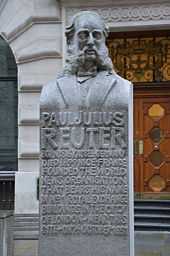Paul Reuter

Paul Julius Freiherr von Reuter (Baron de Reuter) (21 July 1816 – 25 February 1899), a German entrepreneur, pioneer of telegraphy and news reporting[1] was a journalist and media owner, and the founder of the Reuters news agency,[2] since 2008 part of the Thomson Reuters conglomerate.
Biography
He was born in Kassel, Germany, to a Jewish family.[3] His father was a rabbi, Samuel Levi Josaphat, his mother was Betty Sanders. His birthname was Israel Beer Josafat. In Göttingen Reuter met Carl Friedrich Gauss who experimented with the transmission of electrical signals via wire.
On 29 October 1845, he moved to London, where he went by the name Joseph Josephat. On 16 November 1845, he converted to Christianity, in a ceremony at St. George's German Lutheran Chapel in London[4] and changed his name to Paul Julius Reuter. One week later on November 23, he married Ida Maria Elizabeth Clementine Magnus in Berlin.
Reuter, a former bank clerk, became a partner in Reuter and Stargardt, a Berlin book-publishing firm, in 1847. The firm distributed radical pamphlets at the beginning of the Revolutions of 1848, which may have brought official scrutiny on Reuter. Later that year he left for Paris[5] and worked there in Charles-Louis Havas' news agency, the future Agence France Presse. While telegraphy evolved, Reuter first founded the Reuters News Agency in Aachen, which transferred messages between Brussels and Aachen using carrier pigeons. This was the missing link to connect Berlin and Paris. The carrier pigeons were much faster than the post train, giving Reuter faster access to stock news from the Paris stock exchange. In 1851, the carrier pigeons were superseded by a direct telegraph link.[6] A telegraph link was established between Britain and the European continent through the English Channel. This link was extended to the south-western shore of Ireland, at Cork in 1863. There ships coming from America threw canisters containing news into the sea. The news was telegraphed to London, arriving before the ships.

In 1851 Reuter moved back to London and set up an office at the London Stock Exchange. Reuter founded Reuters, one of the major financial news agencies of the world. On 17 March 1857, Reuter was naturalised as a British subject, and on 7 September 1871, the German Duke of Saxe-Coburg-Gotha conferred a barony (Freiherr) on Julius Reuter. The title was later "confirmed by Queen Victoria as conferring the privileges of the nobility in England".[7]
Baron de Reuter had three sons; Herbert, 2nd Baron de Reuter, George, 3rd Baron de Reuter, and André Reuter. His only daughter, Clementine Maria, married Count Otto Stenbock, and after his death, Sir Herbert Chermside, a governor of Queensland.[8] George, 3rd Baron de Reuter had two sons, Oliver, 4th Baron de Reuter, and Ronald Reuter. The last member of the family, Marguerite, Baroness de Reuter, widow of the 4th baron and Paul Reuter's granddaughter-in-law, died on 25 January 2009, at the age of 96.[7][9]
Paul Reuter died in Villa Reuter, Nice, France, and was buried in the family vault at West Norwood Cemetery in London.
Edward G. Robinson portrayed Reuter in the Warner Bros. biopic A Dispatch from Reuter's (1940).
On 25 February 1999, the Reuters News Agency commemorated the 100th anniversary of the death of its founder by launching a university award (Paul Julius Reuter Innovation Award) in Germany.[4]
See also
- German inventors and discoverers
References
- ↑ Paul Julius Reuter: a Dictionary of World History 2000
- ↑ Company History (1889-1799) - Thomson Reuters
- ↑ Paul Reuter - Britannica Student Encyclopaedia
- ↑ 4.0 4.1 Encyclopedia of World Biography 2004
- ↑ http://www.britannica.com/
- ↑ Standage, T. The Victorian Internet (1999)
- ↑ 7.0 7.1 Baroness Reuter, last link to news dynasty, dies
- ↑ ADB - Sir Herbert Chermside
- ↑ "Baroness de Reuter, last link to news dynasty, dies". ABC News (Australia). Reuters. 26 January 2009. Retrieved 21 February 2009.
External links
| Wikimedia Commons has media related to Paul Reuter. |
-
 "Reuter, Paul Julius, Baron de". Encyclopædia Britannica (11th ed.). 1911
"Reuter, Paul Julius, Baron de". Encyclopædia Britannica (11th ed.). 1911 -
 "year=1920". Encyclopedia Americana. 1920.
"year=1920". Encyclopedia Americana. 1920.
|